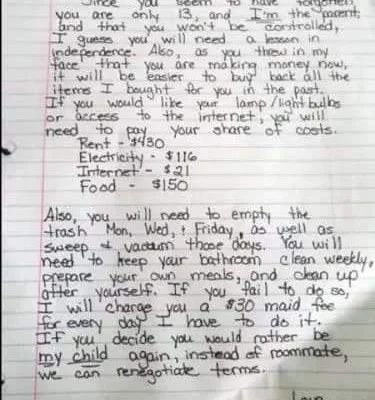Heidi Johnson, a mother from the U.S., recently found herself in the spotlight after her unique parenting method went viral. Her 13-year-old son, Aaron, had begun to show signs of defiance, particularly around schoolwork and household rules. When Aaron, emboldened by the small income he earned from his YouTube channel, claimed he was a “free person” who no longer needed to follow her rules, Heidi decided to teach him a lesson in a way that would resonate.
Heidi wrote a “roommate contract” and taped it to Aaron’s bedroom door. The note outlined the financial responsibilities he would have if he were truly independent: rent, utilities, food, and even fees for the services his mother usually provided, like laundry and cleaning. The contract’s tone was straightforward, aiming to make Aaron realize the real costs of adulthood. According to the note, if Aaron wanted to enjoy the privileges of adulthood, he would need to fully embrace the responsibilities that came with it.
Initially, Aaron reacted with anger, crumpling up the note and storming out. However, after cooling down, he returned to his mother, admitting he didn’t fully grasp the implications of what he had said and asking how he could regain his privileges. Heidi’s note was never about actually charging her son for these services; it was a lesson meant to instill an understanding of the value of what he had and the effort required to maintain it.
The story quickly went viral after Heidi shared the note on social media, attracting widespread attention and sparking debates on parenting styles. Many parents praised Heidi’s approach, seeing it as a creative and effective way to teach responsibility. They commended her for not resorting to traditional punishment but instead using a real-world analogy to drive home an important lesson. The viral nature of the post highlighted the resonance of this message with a broader audience, who saw in it a reflection of the challenges parents face in today’s world.

However, not everyone agreed with Heidi’s method. Some critics accused her of shaming her son publicly, arguing that such issues should be dealt with privately and that the public nature of the lesson could have negative consequences for Aaron’s self-esteem. Heidi responded to these criticisms by explaining that her intention was never to shame Aaron but to prepare him for the realities of life. She emphasized that the lesson was about understanding the balance between freedom and responsibility, a concept she believed was crucial for Aaron to learn.
This incident has brought to the forefront a critical conversation about how parents can best teach their children the values of responsibility, respect, and hard work. In a world where children are increasingly exposed to various influences through social media and other channels, finding ways to instill these values is becoming more challenging. Heidi’s approach, while unconventional, resonated because it directly tied the concept of freedom to the responsibilities that accompany it.
The story also underscores the broader cultural shift in parenting, where traditional methods are increasingly being questioned, and creative, real-world analogies are being used to teach essential life lessons. Heidi’s experience is a testament to the fact that there is no one-size-fits-all approach to parenting. What works for one child may not work for another, and parents must often think outside the box to reach their children effectively.

As this story continues to circulate online, it serves as a reminder that parenting is as much about learning as it is about teaching. Heidi Johnson’s viral note may be just one example of how parents can navigate the complex landscape of modern child-rearing, but it’s a powerful one, illustrating that sometimes, the best lessons are those rooted in real-life experiences.
In conclusion, Heidi Johnson’s viral parenting moment is a reflection of the evolving challenges and creative solutions parents face today. Her story, while specific to her situation, taps into universal themes of responsibility, independence, and the delicate balance of guiding children as they grow. Whether one agrees with her method or not, it’s clear that this story has sparked important conversations about how we prepare the next generation for the world ahead.



